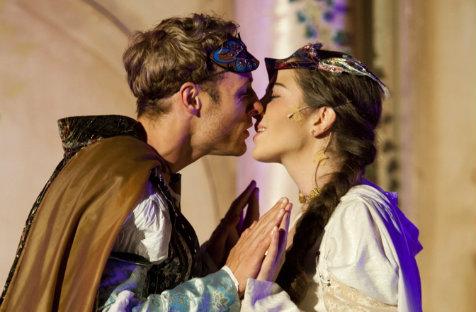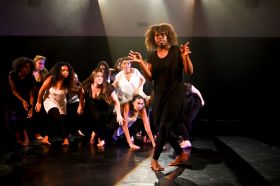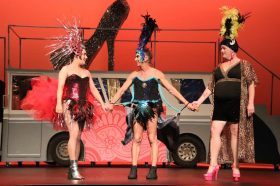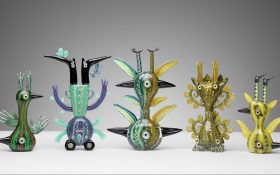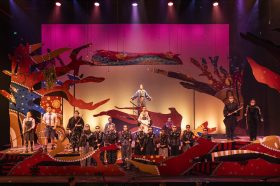EDIT: Since writing this review, the reviewer has learned that the ‘silly dance’ is actually a theatrical convention dating all the way back to Shakespeare’s time. It was customary for the cast to perform a jig at the end of a play, especially following a tragedy to send the audience out with a smile. The reviewer begs the pardon of Glenn Elston and co.
Staging Shakespeare outdoors is no task for the faint-hearted. Not only are you competing with aeroplane noise and the rock band playing in the next park over, you’re pitching the play at a diverse audience who might not be regular theatre-goers, let alone Shakespeare buffs, and who might struggle to understand Elizabethan language and conventions. The Australian Shakespeare Company has a long history of staging outdoor productions of the Bard, but founder and director Glenn Elston seems almost too anxious to make his latest Romeo and Juliet widely accessible, and the result is an accomplished but highly uneven production.
Before the play begins, actors divide the audience up into ‘Capulets’ on one side of the aisle and ‘Montagues’ on the other, explain the background of the families’ feud, then blend into Scene I. This device does aid the transition from reality into the world of the play, and if the editorialising had ended there all would have been fine.
But when actors diverge from the script to add lines with a contemporary flavour, it achieves nothing beyond breaking the illusion. Capulet (Brendan O’Connor) gargling wine and exclaiming ‘Christ, I nearly drowned there,’ isn’t so bad, but Scott Jackson as Mercutio mars his endearingly exuberant performance with a cringeworthy Facebook reference. Even worse is Peter’s (Anthony Rive) distracting barracking during the excellent swordfight between Mercutio and Tybalt (Chris Asimos). This is all clearly at Elston’s behest – the program credits him with ‘script adaptation’.
The superfluousness of this gimmickry is shown up by the actors who do stick to the script. Nick Backstrom as the Friar extracts every last drop of meaning from his lines, and it was obvious from the audience’s applause for him that they had no trouble following. By the same token, Natalia Novikova won big laughs for her bawdy, cynical Nurse.
Of course, any Romeo and Juliet stands or falls on the calibre of the lovers themselves. As a couple, Jamieson Caldwell and Madeleine Field are playful and sweet, taking us on their journey from hormonal swooning to real attachment. The balcony scene features some interesting directorial choices; why does Romeo deliver his soliloquy about Juliet’s beauty to the audience rather than watching her? Is the implication that he’s in love with love, rather than the real live girl behind him?
As the tragedy gathers force, Caldwell’s characterisation becomes deeper and more affecting. His crushed, subdued reaction on learning of Juliet’s death makes an admirably restrained contrast with his earlier histrionics when banished from Verona. Similarly, Juliet’s girlish shock at her parents’ rejection when she refuses to marry Paris – O’Connor’s Capulet is chillingly brutal in this scene – evolves into steely resolve by the time she wakes in the tomb. The death scene is so iconic that it can easily descend into self-parody, but Caldwell and Field find the necessary raw emotion to render it heartbreakingly fresh.
Why then, oh why, would Elston trash all that hard-won pathos by making the cast do a silly skipping dance for their curtain call? It completely ruins the moment, cheating us of tragedy’s catharsis.
An event like this is no place for purists and, it could well be argued, more in keeping with the true spirit of Shakespeare than precious theatre productions: one simple set; the audience eating and drinking throughout; exalted language for the intellectuals and cheap gags for the groundlings. Certainly, this production makes the most of the Botanic Garden’s potential for spectacle, with particular highlights being the dance during the masked ball at sunset, and the ‘fog’ rolling across the grass during the final scene. This Romeo and Juliet would make a great introduction to Shakespeare for the uninitiated, but it could afford to give more credit to its audience, to its actors, and to Will’s ability to reach us effortlessly across the centuries.
Romeo and Juliet
The Australian Shakespeare Company
Director and Script Adaptation: Glenn Elston
Musical Director: Paul Norton
Costume Designer: Karla Erenbots
Production Manager: Ashley Groenen
Scenic Artist: Barry Drynan
Lighting Operator: Gordon Boyd
Fight Choreographer: Felicity Steel
Dance Choreographer: Sue-Ellen Shook
Set Construction: Paul Moffit
Sound: Shaye Davitt
Crew: Blaze Lenkic, Jonathan Sporle, Thomas Dunkin, Peter Barry, Otis Elston, Anthony Rive, Jasper Devitt, Rose Connors-Dance
Cast includes Jamieson Caldwell, Madeleine Field, Scott Jackson and Brendan O’Connor
Royal Botanic Gardens, Melbourne
20 December – 9 March
